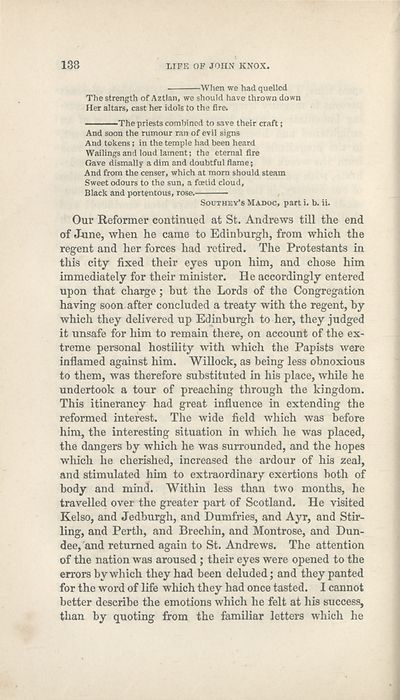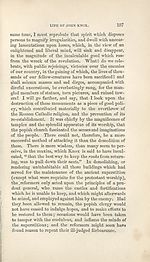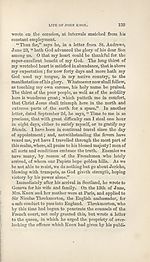Download files
Complete book:
Individual page:
Thumbnail gallery: Grid view | List view

138
E OF JOHN KNOX.
When we had quelled
The strength of Aztlan, we should have thrown down
Her altars, cast her idols to the fire.
The priests combined to save their craft;
And soon the rumour ran of evil signs
And tokens; in the temple had been heard
Wailings and loud lament; the eternal fire
Gave dismally a dim and doubtful flame;
And from the censer, which at morn should steam
Sweet odours to the sun, a foetid cloud.
Black and portentous, rose.
Southey’s Madoc, part i. b. ii.
Our Reformer continued at St. Andrews till the end
of June, when he came to Edinburgh, from which the
regent and her forces had retired. The Protestants in
this city fixed their eyes upon him, and chose him
immediately for their minister. He accordingly entered
upon that charge; hut the Lords of the Congregation
having soon after concluded a treaty with the regent, by
which they delivered up Edinburgh to her, they judged
it unsafe for him to remain there, on account of the ex¬
treme personal hostility with which the Papists were
inflamed against him. Willock, as being less obnoxious
to them, was therefore substituted in his place, while he
undertook a tour of preaching through the kingdom.
This itinerancy had great influence in extending the
reformed interest. The wide field which was before
him, the interesting situation in which he was placed,
the dangers by which he was surrounded, and the hopes
which he cherished, increased the ardour of his zeal,
and stimulated him to extraordinary exertions both of
body and mind. Within less than two months, he
travelled over the greater part of Scotland. He visited
Kelso, and Jedburgh, and Dumfries, and Ayr, and Stir¬
ling, and Perth, and Brechin, and Montrose, and Dun¬
dee, and returned again to St. Andrews. The attention
of the nation was aroused ; their eyes were opened to the
errors by which they had been deluded; and they panted
for the word of life which they had once tasted. I cannot
better describe the emotions which he felt at his success,
than by quoting from the familiar letters which he
E OF JOHN KNOX.
When we had quelled
The strength of Aztlan, we should have thrown down
Her altars, cast her idols to the fire.
The priests combined to save their craft;
And soon the rumour ran of evil signs
And tokens; in the temple had been heard
Wailings and loud lament; the eternal fire
Gave dismally a dim and doubtful flame;
And from the censer, which at morn should steam
Sweet odours to the sun, a foetid cloud.
Black and portentous, rose.
Southey’s Madoc, part i. b. ii.
Our Reformer continued at St. Andrews till the end
of June, when he came to Edinburgh, from which the
regent and her forces had retired. The Protestants in
this city fixed their eyes upon him, and chose him
immediately for their minister. He accordingly entered
upon that charge; hut the Lords of the Congregation
having soon after concluded a treaty with the regent, by
which they delivered up Edinburgh to her, they judged
it unsafe for him to remain there, on account of the ex¬
treme personal hostility with which the Papists were
inflamed against him. Willock, as being less obnoxious
to them, was therefore substituted in his place, while he
undertook a tour of preaching through the kingdom.
This itinerancy had great influence in extending the
reformed interest. The wide field which was before
him, the interesting situation in which he was placed,
the dangers by which he was surrounded, and the hopes
which he cherished, increased the ardour of his zeal,
and stimulated him to extraordinary exertions both of
body and mind. Within less than two months, he
travelled over the greater part of Scotland. He visited
Kelso, and Jedburgh, and Dumfries, and Ayr, and Stir¬
ling, and Perth, and Brechin, and Montrose, and Dun¬
dee, and returned again to St. Andrews. The attention
of the nation was aroused ; their eyes were opened to the
errors by which they had been deluded; and they panted
for the word of life which they had once tasted. I cannot
better describe the emotions which he felt at his success,
than by quoting from the familiar letters which he
Set display mode to:
![]() Universal Viewer |
Universal Viewer | ![]() Mirador |
Large image | Transcription
Mirador |
Large image | Transcription
| Antiquarian books of Scotland > Scotland/Scots > Life of John Knox ; and, The life of Alexander Henderson > (156) |
|---|
| Permanent URL | https://digital.nls.uk/131834176 |
|---|
| Description | Thousands of printed books from the Antiquarian Books of Scotland collection which dates from 1641 to the 1980s. The collection consists of 14,800 books which were published in Scotland or have a Scottish connection, e.g. through the author, printer or owner. Subjects covered include sport, education, diseases, adventure, occupations, Jacobites, politics and religion. Among the 29 languages represented are English, Gaelic, Italian, French, Russian and Swedish. |
|---|

